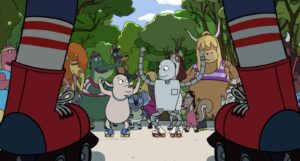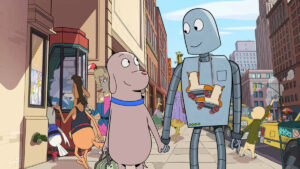Publication Date: 09-07-2024
Robot Dreams (2023) review
Dir. Pablo Berger
By: Steve Pulaski
Rating: ★★★★
Screened at Carnegie-Stout Public Library in Dubuque, IA on September 5th, 2024 as part of their monthly “Movie Night” events.
“Do you remember, The 21st night of September?” – “September,” Earth, Wind & Fire
Robot Dreams is, in itself, the stuff of dreams. An immaculately animated film that’s visually arresting with a story that captivates you on many levels. It makes you smile, laugh, nod in affirmation, unconsciously shake your head in relatability, and maybe even shed a tear. It’s the complete package of entertainment and truth, giftwrapped in a special picture.
The two central characters in the wordless film are only rivaled by a third, the backdrop of 1984 New York. Director Pablo Berger and a dutiful team of animators have crafted a love-letter to the Big Apple, towered only by the presence of the World Trade Center and the Empire State Building. Populating this city are a cavalcade of animals that breakdance, do street performance, run small businesses, blast music from their boomboxes, hold rooftop parties, and coexist happily with one another at places like Ocean Beach. No animated metropolis has felt this lived-in since Zootopia.

As we know all too well, the bustling city-life can still breed loneliness, which is what a character known only as Dog is experiencing one night as he sulks on the couch playing Pong against himself and eating a Banquet TV dinner (the specificity of everything from brands to locations is one of many thoughtful touchpoints). Dog decides to order a robot friend through the mail. Upon its arrival and subsequent building, the tall metal titan, known only as Robot, and Dog become instant best friends. They spend their days drifting through Manhattan, dancing to the eternal banger “September” by Earth, Wind & Fire (more on its significance later), and soaking up the long afternoons of summer.
At the end of the season, Dog and Robot go to the beach, only for Robot’s joints to rust from playing in the water. He’s too heavy to move, forcing Dog to abandon him. When he returns, the beach is closed for season, and despite pleas to the security guard, and even the city government, Dog cannot enter to fix and retrieve him. He must wait till next summer if he wants to see him again. In turn, Robot Dreams follows the once-inseparable pair who are now forced to be separated. Dog takes a vacation to the Catskills. Robot watches the world pass by, sometimes visited by a mean trio of bunnies or a kind mother bird.
Berger, who adapts the graphic novel by Sara Varon, has limitless creativity for this story. He introduces numerous side-characters, including a jolly, oafish snowman who bowls with his head, along with a grouchy, cigar-chomping gator who runs a junkyard. Therein are also numerous set-pieces, including a dance-number set along the Yellow Brick Road, various dream sequences, and a seemingly infinite number of touching, smaller moments that need to be experienced to be appreciated.

The aforementioned song “September,” which exists in this film in a couple of different versions, is more than just an irresistibly dance-y tune for Dog and Robot. The opening line “do you remember?” essentially asks the audience if they remember the friendships that formed us. Maybe they didn’t last forever, but their impact never left you. Also consider the line “The 21st night of September.” September 21st coincides with the end of summer and the beginning of fall. As a result, it would make sense that the beach Dog and Robot visit would close the day after their escapades. That detail gives a whole new meaning to the term diegetic music.
Robot Dreams may not end the way you want, but it ends the way it should. Life is rarely like the movies; a flaw of life, if you ask me. Time passes. People literally move and mentally move forward. Malice and contempt is not the reason most friendships end. What’s left are irreplaceable memories that inspire happiness and can be carried with you for the rest of your life. This kind of heartfelt poignancy, expertly detailed without mawkish sentimentality, is rare in movies these days, so much so that even though Berger’s film is plenty long at 103 minutes, I felt a peculiar sadness when the credits finally rolled. To quote another song, one germane to Robot Dreams, I thought of an apropos line that Kenny Chesney sang: “I’d do it all over, cause, damn, it was good knowing you.”
Directed by: Pablo Berger.
About Steve Pulaski
Steve Pulaski has been reviewing movies since 2009 for a barrage of different outlets. He graduated North Central College in 2018 and currently works as an on-air radio personality. He also hosts a weekly movie podcast called "Sleepless with Steve," dedicated to film and the film industry, on his YouTube channel. In addition to writing, he's a die-hard Chicago Bears fan and has two cats, appropriately named Siskel and Ebert!


